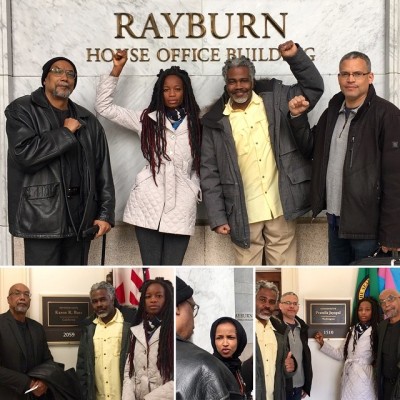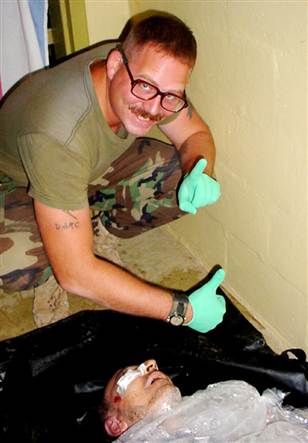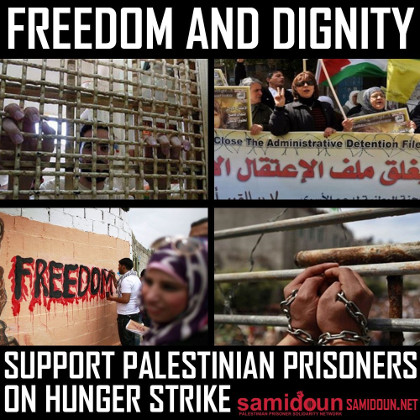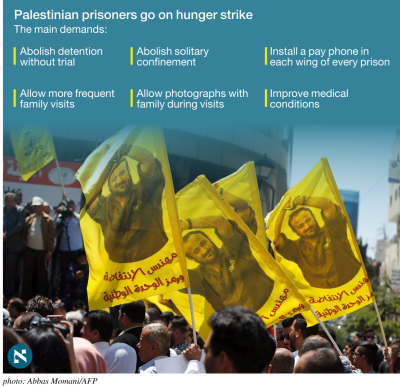
Prisoner Support Organizations Needed for Liberation
June 16, 2017 was a day of my current prison life that I would never forget, no matter how hard I try or no matter what my mental health counselors tell me about “letting go.” On this particular day, I was being escorted down the walkway at Suwannee Correctional Institution by a prison official by the name of Sergeant Moore, when out of nowhere Sergeant Moore placed his right leg in front of my shackled feet and slammed me face first on the concrete floor, splitting my bottom lip on impact and knocking out three of my front teeth. Then he began repeatedly punching me in the face while stating “I’ll catch you in this blind spot every time mother fucker.”
As this tragic incident was taking place, another prison official by the name of Lieutenant Riegel ran up to me, grabbed both sides of my face, and banged my head against the floor three times before more officers responded to the scene to take me to medical. I was taken to an outside hospital for facial trauma.
The bad part about this entire incident is that neither the prison’s administration nor the Inspector Generals Office did anything about this incident, because the prison officials fabricated the paperwork stating that I attacked Sergeant Moore. In reality, Sergeant Moore was the one who attacked me, out of retaliation for the ongoing problems I was having with security at Suwannee C.I.
In addition, I was in full restraints from my hands down to my waist and feet at the time of this incident, which made it impossible for me to have attacked Sergeant Moore. The prison administration knew this. However, they still swept this incident under the rug like they tend to do when officers brutally assault prisoners.
Now don’t get me wrong, I’ve always heard of officers jumping on inmates in full restraints, but when it actually happened to me, my eyes were instantly opened to the corruption that’s taking place in the Florida prison system, especially at prisons like Florida State Prison, Suwannee Correctional Institution, and Union Correctional Institution.
For example, there’s something called the “Cell Extraction Team,” which is a group of five officers, dressed in riot gear, whose sole purpose is to go inside of a cell and restrain a prisoner who allegedly “refuses” to submit to hand restraints. However, instead of sticking to the sole objective, these officers are often times going inside these cells and brutally beating inmates by kicking them, punching them, kicking their teeth out, etc. And while they’re doing this, they’re yelling “stop resisting.” How can an inmate possibly resist when five officers are beating him? The entire time they’re doing this, another officer stands in the doorway to block the view of the camera. I’m currently speaking from personal experience.
Another example is there’s something called “Property Restriction,” which is when officers strip a prisoner of all his property and clothes and leave them inside their cell in just a pair of boxers to sleep on the hard metal bunk, for allegedly “misusing” their property. However, instead of using property restriction for what it’s intended for, officers are using this as a tool to simply strip a prisoner of all their clothes, and they are mainly doing this in the winter time. Once again, I am speaking from personal experience. Most states have actually abolished property restriction practices in prisons, deeming it cruel and inhuman treatment of prisoners, but it is still going on in the Florida prison system.
Truth be told, officers aren’t the only ones that’s participating in the corruption. The nurses are guilty as well because whenever officers assault inmates, instead of documenting our injuries, nurses are covering up for the officers by not documenting our injuries.
In addition to that, whenever we file grievances reporting what officers are doing to us, the grievance coordinators are throwing away grievances. Which is why I’ve decided to write this short story to shine some light on the corruption that’s taking place.
The worst part is, the Florida Prison system administration is fully aware of this cruel and inhuman treatment that’s being inflicted upon inmates, because they’re the ones who sign off on the paperwork. Yet still they’re not doing anything about it.
No one deserves to be treated this way. The readers of this article can even go online and see with their own eyes that Suwannee C.I. was under investigation for this same corruption a few years ago.
Now, I know some people may feel like we are criminals so we deserve to suffer in prison. However, our mistakes don’t define who we are as a person. It’s our heart. And I know there’s people in the community who know some very good-hearted people that’s locked up in prison. In addition to that, since I’ve been incarcerated, I’ve written three novels and I’m currently working on my fourth novel, which shows that coming to prison has actually turned out to be a blessing in disguise. Because if I hadn’t come to prison I would have never discovered my God-given talent.
My only desire now is to expose the corruption in the Florida prison system because not only are these officials mistreating us, but they are also taking advantage of us.
I’m just trying to show the community how corrupted the prison system is, and it should not be this way. Prison is supposed to be a place for prisoners to rehabilitate themselves before they go back into society. But how can we rehabilitate ourselves if we are constantly being mistreated in prison, and then they wonder why prisoners get out of prison and do the same thing. Because we didn’t learn anything.
And whether or not the community believes it, prisons are some of the most corrupted places in the world. I’ve seen officers purposely put two inmates in the same cell, knowing that both inmates were having problems with each other. And these are just some of the things prison officials have been doing.
Consequently, I’m sincerely asking that the community assist us with pushing the “Prison Lives Matter Organization” (PLM Organization) because it’s only so much us as inmates can do from behind the doors. I’ve already written the blueprint for the PLM Organization and I don’t mind sharing it with someone who’s interested in being the co-founder of the organization. However, I’m looking for people who’s sincerely going to put their heart and dedication into bringing about a change in the Florida Prison System. If you are a serious inquiry, then you may contact MIM Distributors for information on how you can contact me, and you can be part of the PLM Organization.
PTT from MIM(Prisons) responds:We fully echo this comrade’s call for people on the outside to get involved in supporting prisoners’ struggles. We are even recruiting for our own outside-support organization, and it’s in a similar phase as PLM Organization. The main thing lacking right now is people getting involved. If you are inspired to contribute to prisoners’ struggles in Florida or elsewhere, but can’t join MIM(Prisons) at a cadre level for whatever reason, we would be ecstatic to support the development of a new prisoner-support mass organization.
We have a policy that we don’t build organizations outside of the MIM(Prisons) umbrella, but a prisoner-support mass organization led by MIM(Prisons) can work in united front with other groups like the PLM Organization. Or maybe the Maoist-led mass organization takes on the work that encompasses what PLM is out to transform, so prisoners have an organization they can turn to rather than needing to start their own from behind bars as individuals. There’s a great opportunity here and we encourage “people who’s sincerely going to put their heart and dedication into bringing about a change” to get in touch with MIM(Prisons) directly via our contact page.
We have a different view than this comrade about the role of prisons and the causes of criminality in our present United $tates society. Where ey says that going to prison was a blessing in disguise, we ask, “why aren’t there opportunities for certain populations of people to develop their talents outside of prison?” And where ey says mistake don’t define a persyn, we ask, “why are people committing these mistakes in the first place?” And “who gets to say what counts as a crime, or not?” Clearly there are many, many people in U.$. society who do things that harm many other people, and they are not considered to be criminals, and are not punished by the court system. So, why is that?
It would be great if prisons were a place where people who harm other people go to see the errors of their ways and transform into people who are able to contribute to society. Like this comrade who started writing novels and advocating for prisoners’ rights behind the walls. In fact, that’s what prisons were like in communist China under Mao Zedong, and that’s a social model that we look to for inspiration and guidance on how we can create it in our own future. Chinese society under Mao is where we get our name “Maoist” from. We are big fans.
And we look to Chinese society under Mao for how we can create a culture and economic system that means people aren’t committing crimes that stem from survival needs, or mental health issues, or historical trauma. Imagine how much less harm there would be in the world if these low-level “crimes” became obsolete – if people’s survival needs were met, mental health was taken care of, and historical trauma was healed and not perpetuated. Not to mention if the capitalist crimes against humynity were abolished, and we had clean rivers, and all peoples were allowed to thrive.
So we think prisons in this country are working exactly as designed. They’re not really “corrupted,” because the entire purpose of them is for social control, to keep certain populations and certain ideas suppressed. Every act that communicates that “prisoners’ lives don’t matter” and “you can’t do that” is part and parcel to prisons under capitalism. When you consider that capitalist prisons aren’t meant to rehabilitate “criminals,” you can see that they are actually working perfectly. Whether by punishment (beatings, isolation) or reward (TV, privileges), U.$. prison administrators are doing their job and doing it well.
MIM(Prisons) aims to get at the root of this suffering, which we see as the capitalist economic system itself. On the surface, the economic system might seem unrelated to abuse of prisoners, and to a certain extent we could have better prison conditions (prison reform) under capitalism. But as Maoists we are out to create a world free from all oppression, not just a relief of some oppression for a few groups. Where some groups are given privileges, other groups are still suffering and often times suffering worse to make up for it. We believe that only through addressing the root cause of the suffering – capitalism and imperialism – can we fully support prisoners’ struggles here and around the world.











